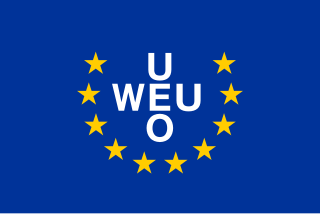
The Western European Union (WEU) was the international organisation and military alliance that succeeded the Western Union (WU) after the 1954 amendment of the 1948 Treaty of Brussels. The WEU implemented the Modified Brussels Treaty. The WEU member states were also allies of the United States during the Cold War through the North Atlantic Treaty Organization (NATO).
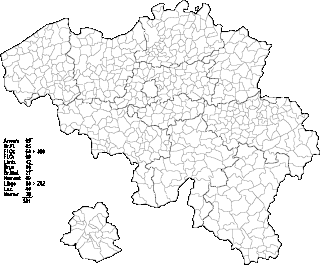
Belgium comprises 581 municipalities grouped into five provinces in each of two regions and into a third region, the Brussels-Capital Region, comprising 19 municipalities that do not belong to a province. In most cases, the municipalities are the smallest administrative subdivisions of Belgium, but in municipalities with more than 100,000 inhabitants, on the initiative of the local council, sub-municipal administrative entities with elected councils may be created. As such, only Antwerp, having over 500,000 inhabitants, became subdivided into nine districts. The Belgian arrondissements, an administrative level between province and municipality, or the lowest judicial level, are in English sometimes called districts as well.

Queen Mathilde of Belgium is the wife of King Philippe, who ascended the throne following the abdication of his father, King Albert II, on 21 July 2013. She is the first Belgian-born Queen of the Belgians.

Belgium is a federal state with a multi-party political system, with numerous parties who factually have no chance of gaining power alone, and therefore must work with each other to form coalition governments.
The Royal Academies for Science and the Arts of Belgium (RASAB) is an association which promotes and organises science and the arts in Belgium by coordinating the national and international activities of its constituent academies such as the National Scientific Committees and the representation of Belgium in international scientific organisations.

In Belgium, the French Community refers to one of the three constituent constitutional linguistic communities. Since 2011, the French Community has used the name Wallonia-Brussels Federation, which is controversial because its name in the Belgian constitution has not changed and because it is seen as a political statement. The name "French Community" refers to Francophone Belgians, and not to French people residing in Belgium. As such, the French Community of Belgium is sometimes rendered in English as "the French-speaking Community of Belgium" for clarity.

The International Textile, Garment and Leather Workers' Federation (ITGLWF) was a global union federation. In 2005 it had 217 member organizations in 110 countries, representing a combined membership of over 10 million workers.

Constantin Meunier was a Belgian painter and sculptor. He made an important contribution to the development of modern art by elevating the image of the industrial worker, docker and miner to an icon of modernity. His work is a reflection of the industrial, social and political developments of his day and represents a compassionate and committed view of man and the world.

Jean Joseph Camille Huysmans was a Belgian politician.
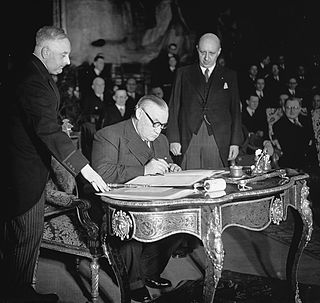
The Treaty of Brussels, also referred to as the Brussels Pact, was the founding treaty of the Western Union (WU) between 1948 and 1954, at which it point it was amended as the Modified Brussels Treaty (MTB) and served as the founding treaty of the Western European Union (WEU) until its termination in 2010. The treaty provided for the organisation of military, economic, social and cultural cooperation among member states, as well as a mutual defence clause.

The Belgian Resistance collectively refers to the resistance movements opposed to the German occupation of Belgium during World War II. Within Belgium, resistance was fragmented between a large number of separate organizations, divided by region and political stances. The resistance included both men and women from both Walloon and Flemish parts of the country. Aside from sabotage of military infrastructure in the country and assassinations of collaborators, these groups also published large numbers of underground newspapers, gathered intelligence and maintained various escape networks that helped Allied airmen trapped behind enemy lines escape from German-occupied Europe.
Catholic Action was the name of many groups of lay Catholics who were attempting to encourage a Catholic influence on society.

Islam in Belgium is a minority religion and the second largest religion in the country after Christianity. The exact number of Muslims in Belgium is unknown but various sources estimate that 4.0% to 6.5% of the country's population adheres to Islam. The first registered presence of Islam in Belgium was in 1829, but most Belgian Muslims are first-, second-, or third-generation immigrants that arrived after the 1960s.
Pillarisation is the politico-denominational segregation of a society, or the separation of a society into groups by religion and associated political beliefs. These societies were "vertically" divided two or more several groups known as pillars. The best-known examples of this have historically occurred in the Netherlands and Belgium.
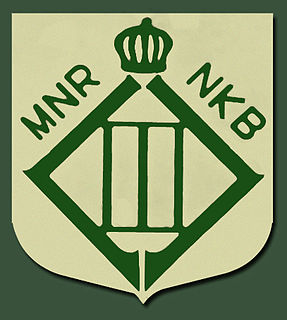
The National Royalist Movement was a group within the Belgian Resistance in German-occupied Belgium during World War II. It was active chiefly in Brussels and Flanders and was the most politically right-wing of the major Belgian resistance groups.

The German occupation of Belgium during World War II began on 28 May 1940 when the Belgian army surrendered to German forces and lasted until Belgium's liberation by the Western Allies between September 1944 and February 1945. It was the second time that Germany had occupied Belgium in under thirty years.
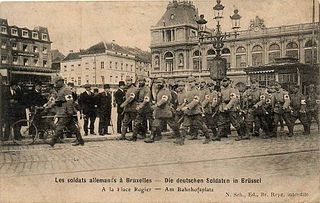
The German occupation of Belgium of World War I was a military occupation of Belgium by the forces of the German Empire between 1914 and 1918. Beginning in August 1914 with the invasion of neutral Belgium, the country was almost completely overrun by German troops before the winter of the same year as the Allied forces withdrew westwards. The Belgian government went into exile, while King Albert I and the Belgian Army continued to fight on a section of the Western Front. Under the German military, Belgium was divided into three separate administrative zones. The majority of the country fell within the General Government, a formal occupation administration ruled by a German general, while the others, closer to the front line, came under more repressive direct military rule. The German occupation coincided with a widespread economic collapse in Belgium with shortages and widespread unemployment, but also with a religious revival. Relief organisations, which relied on foreign support to bring food and clothing to Belgian civilians, cut off from imports by the Allied naval blockade and the fighting, also became extremely important to the social and cultural life of the country.
Vietnamese people in Belgium or Vietnamese Belgian refers to people of Vietnamese ancestry who were born in or immigrated to Belgium. The population of the community is about 14,000 as of 2012.

The Communist League was an international political party established on June 1, 1847 in London, England. The organisation was formed through the merger of the League of the Just, headed by Karl Schapper and the Communist Correspondence Committee of Brussels, Belgium, in which Karl Marx and Friedrich Engels were the dominant personalities. The Communist League is regarded as the first Marxist political party and it was on behalf of this group that Marx and Engels wrote the Communist Manifesto late in 1847. The Communist League was formally disbanded in 1852, following the Cologne Communist Trial.

Brussels Soldiers' Council was a revolutionary organisation created by mutinous soldiers of the Imperial German Army based in Brussels, Belgium on 9 November 1918. Mutinous German soldiers collaborated with Belgian workers to declare a socialist republic with equal and universal suffrage. However, as the primary concern of the German soldiers was to return home, the remaining Belgian workers were unable to prevent the advancing Allied armies from handing over authority to the Belgian nationalists.


















